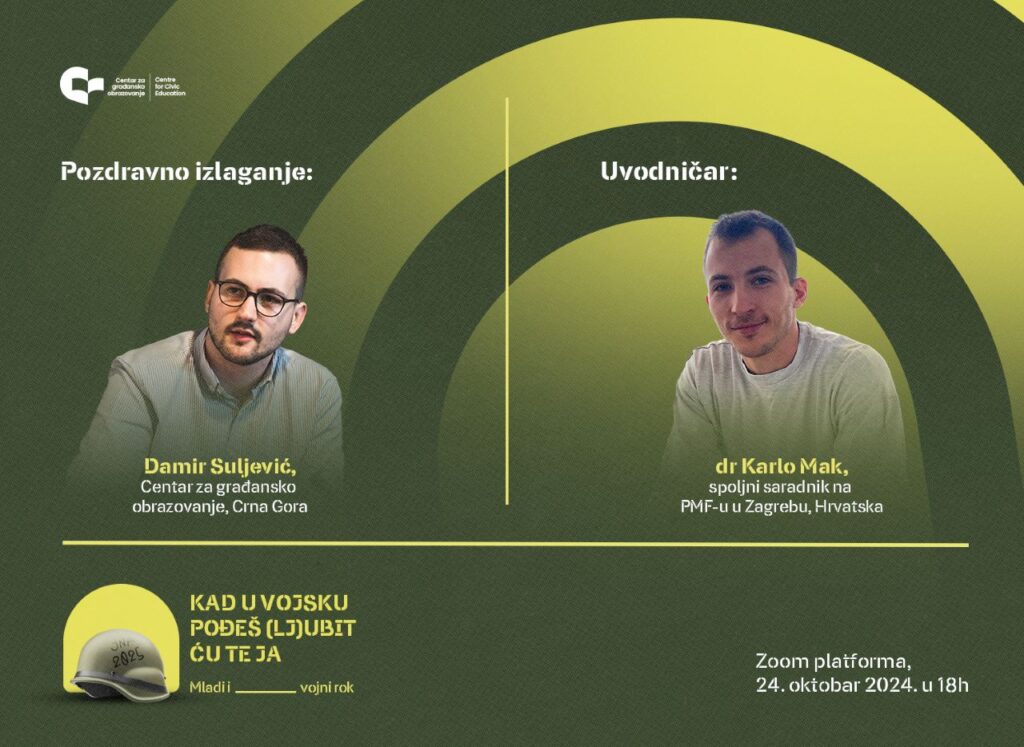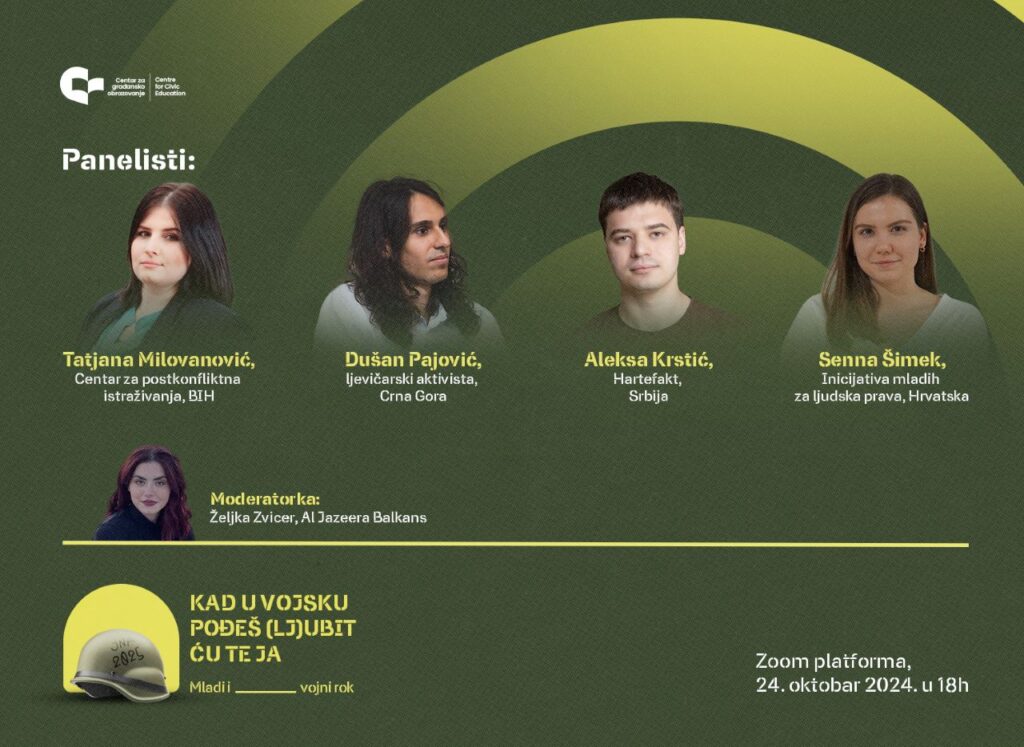“Young people have great potential, but society restricts them from channeling their energy in the right directions, and there is even a noted increase in youth violence. It is encouraging to see that young people want to contribute positively to society, but we should hope that military service does not become their only exit strategy,” was one of the remarks made during the online panel discussion “When You Go to the Army, I’ll (Not) Kill You – Youth and Military Service,” organized last night by the Centre for Civic Education (CCE).
Opening the event, Damir Suljević, the Human Rights Programme Coordinator at CCE, highlighted that this spontaneous initiative came as a response to the recognized need for such discussions in Montenegro and across the region, particularly as some countries in the region are moving forward with the idea of reintroducing mandatory military service.
Dr. Karlo Mak, an external associate at the Faculty of Natural Sciences and Mathematics at the University of Zagreb, pointed out that the introduction of military service, whether mandatory or voluntary, is a complex issue as it is often formally prescribed one way while implemented differently in practice. He illustrated various models in practice through detailed examples from different countries, including Croatia, where he noted that publicly available data is limited. “Between 2021 and 2023, interest in voluntary military service declined significantly. In the past 15 years, since it became non-mandatory, around 11,000 citizens – or roughly 650 citizens annually – participated in voluntary military service. This context is not conducing for reintroducing mandatory military service,” he observed. Mak believes that Slovenia could serve as a model. “Slovenia does not have mandatory military service, but it offers military camps, lasting 14 days, aimed only at adults and focusing on what is called civil service – providing training for emergency situations and survival in nature,” he explained. “Instead of addressing issues through diplomacy and peaceful dispute resolution, it seems that our societies, and those across Europe, are moving toward militarization. I believe it would be more beneficial for all societies to develop civil protection systems, especially to address climate change, which poses the greatest threat to humanity and world peace,” Mak concluded.
Tatjana Milovanović from the Centre for Post-Conflict Research in Bosnia and Herzegovina, Dušan Pajović, a left-wing activist from Montenegro, Aleksa Krstić from the Hartefakt Foundation in Serbia, and Senna Šimek from the Youth Initiative for Human Rights in Croatia also shared their views during the panel.
“Military parades, unconstitutional celebrations of Republika Srpska Day, and secessionist rhetoric represent just part of the challenges in Bosnia and Herzegovina, particularly in the Republika Srpska entity, which has deepened ethnic divides,“ stated Tatjana Milovanović. Reflecting on years of youth work in Bosnia, she identified three categories among young people. “The first group is indifferent to these issues; they live in Bosnia, and their primary concerns are employment, love, and other aspects of youthful life. The second group consists of those who have found their identity in that particular version of Republika Srpska, for whom, given their age and the years of ethnic nationalism here, being ethnically Serbian forms a significant part of their identity. At the mere thought that RS Day might not exist or that Republika Srpska itself is founded on war crimes, they are very ready to come to its defense. The third group are young people who have left the country and, in the diaspora, have no issues cooperating with other young people from the region who have also left and have found love and friendships there,” Milovanović notes.
Dušan Pajović points out that one aspect of the issue surrounding military service in this region is the memory of the 1990s, a fresh and traumatic experience for the population that lived through it. “Historically, this was the first war on European soil after World War II and the first genocide in Europe since then. This resonates as a generational—and I would say transgenerational—trauma within all of us,” he assesses. Speaking on the concept of national identity in the military and nation-states, Pajović finds them equally senseless, almost as senseless as war itself. “If we look at the military context, an infantry soldier has much more in common with an infantryman on the opposite side than with his own general. I am certain they read similar literature, listened to similar music, and had similar life experiences, more so than someone of an entirely different educational and economic class,” Pajović concluded.
“ I believe that in Serbia, ever since the end of the war in the 1990s, there has been a general militarization of society, where the wars of the 90s are mythologized, along with previous wars, such as the World War I and the Balkan Wars, promoting war as part of identity. This is especially relevant for the idea of a Greater Serbia, which, unfortunately, has yet to fade away,” said Aleksa Krstić. “In this regard, the attitudes of young people are quite similar to that. A few years ago, the Youth Umbrella Organization of Serbia (KOMS) conducted a survey on the needs of young people in Serbia, finding that 44% of them support the introduction of compulsory military service. On the other hand, since 2011, when compulsory military service was abolished in Serbia, and to this day, we have a system where military service is voluntary, but also the fact that there were not many young people who were interested in it. So, we have attitudes that do not correspond with the reality on the ground“, Krstić emphasizes.
“When it comes to introducing compulsory military service, both for men and women, I think we need to be careful not to enter into some kind of discursive terrain, that is, a framework that this is a form of gender equality, where men and women should be equally represented. We often hear arguments like how we need to learn how to make our beds, which are used to highlight the positive aspects of military service and send the message that, in this way, both women and men will be able to men learn to be adults. I think we should stop there and be careful, because in this advocacy against the introduction of mandatory military service we must not fall into that terrain,” Senna Šimek points out.
The discussion brought together young people from Montenegro, Serbia, Croatia, and Bosnia and Herzegovina, who used this opportunity to share and hear diverse perspectives on this increasingly relevant issue, as their voices often remain underrepresented in the public sphere.
Nikola Đurašević, Program Associate


